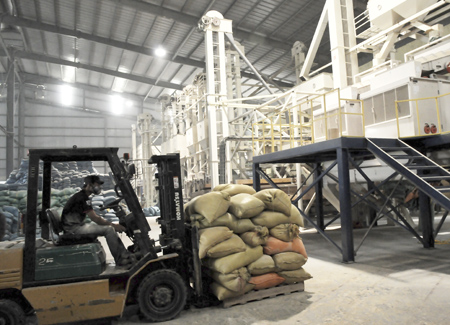Requirements for Infrastructure for Rice Milling Facilities
This is the content stipulated in Circular 12/2013/TT-BNNPTNT issued by the Ministry of Agriculture and Rural Development, regulating the National Technical Standards for Grain Warehouses and Rice Milling Facilities.
Organizations and individuals engaged in rice export business and related entities must comply with technical requirements regarding infrastructure for rice milling facilities serving rice export businesses as stipulated in the National Technical Regulation on Rice Milling Facilities (Code: QCVN 01 - 134: 2013/BNNPTNT) promulgated together with Circular 12/2013/TT-BNNPTNT. Specifically detailed as follows:

Illustration (source: internet)
- Location of the rice milling facility:
- Must not be prone to flooding due to rain, floods, or high tides (if so, appropriate measures must be taken to protect against and prevent flooding).
- Must be located in an area with convenient transportation (road or waterway), a good transportation network, and facilitate the loading and unloading, and transportation of rice.
- Must be away from sources of pollution.
Regarding the premises of the processing facility: Must ensure sufficient space to arrange a rice milling line with a minimum capacity of 10 tons per hour, meeting the technical requirements for rice processing technology.
Internal roads within the facility: Must be constructed to meet sanitation standards, equipped with well-functioning, enclosed drainage systems that do not cause pollution and ensure cleanliness.
Factory structure must comply with industrial building regulations as follows:
- The factory of the rice milling facility must be suitably arranged and convenient for production processes.
- Building foundation: made of concrete ensuring firmness and stability without subsidence.
- Floor: must be compacted, free of subsidence, paved with light-colored, non-absorbent materials, easy to clean, non-slip, non-toxic, easy to clean and disinfect, and with good drainage.
- Walls: light-colored, non-absorbent, easy to clean, and disinfect.
- Roof: sloped or curved, non-absorbent, leak-proof, with installed ventilation and natural lighting windows.
- Doors: must ensure water-tightness when closed.
- Windows: must be easy to clean and designed to minimize dust accumulation.
Ventilation system: Must have a ventilation system (including both forced and natural ventilation) suitable to the specific characteristics of the rice milling processing facility, ensuring ventilation, cleanliness, and dust-free conditions within the premises, thus ensuring environmental safety and hygiene for the production facility.
Lighting system:
- The lighting system within the workshop (including electric lights, natural outdoor light windows) must provide adequate illumination as per regulations.
- Lighting fixtures must be shielded for safety to prevent breakage and ensure that in case of breakage, the fragments do not fall into the product.
- Waste collection and treatment system:
- Garbage bins must be placed conveniently throughout the workshop and production area.
- Must have a regular waste collection and treatment system.
- Sanitary system:
- The sanitary system must be fully equipped with hygiene facilities and hand sinks, conveniently located and isolated from the production area. On average, one restroom is required for every 25 people.
- The sanitary area must have a lighting system, a ventilation system, and an easy drainage system to eliminate waste and ensure sanitation. Restrooms must be built to be enclosed, not affecting the hygiene of the surrounding area.
Refer to the full text of the regulations in Circular 12/2013/TT-BNNPTNT which took effect on August 06, 2013.
Thu Ba
- Number of deputy directors of departments in Vietnam in accordance with Decree 45/2025/ND-CP
- Cases ineligible for pardon in Vietnam in 2025
- Decree 50/2025 amending Decree 151/2017 on the management of public assets in Vietnam
- Circular 07/2025 amending Circular 02/2022 on the Law on Environmental Protection in Vietnam
- Adjustment to the organizational structure of the Ministry of Health of Vietnam: Certain agencies are no longer listed in the organizational structure
- Vietnam aims to welcome 22-23 million international tourists in Vietnam in 2025
-

- Notable new policies of Vietnam effective as of ...
- 16:26, 11/04/2025
-
.Medium.png)
- Notable documents of Vietnam in the previous week ...
- 16:21, 11/04/2025
-
.Medium.png)
- Notable documents of Vietnam in the previous week ...
- 16:11, 02/04/2025
-
.Medium.png)
- Notable new policies of Vietnam to be effective ...
- 16:04, 02/04/2025
-
.Medium.png)
- Notable new policies of Vietnam effective from ...
- 14:51, 21/03/2025
 Article table of contents
Article table of contents
